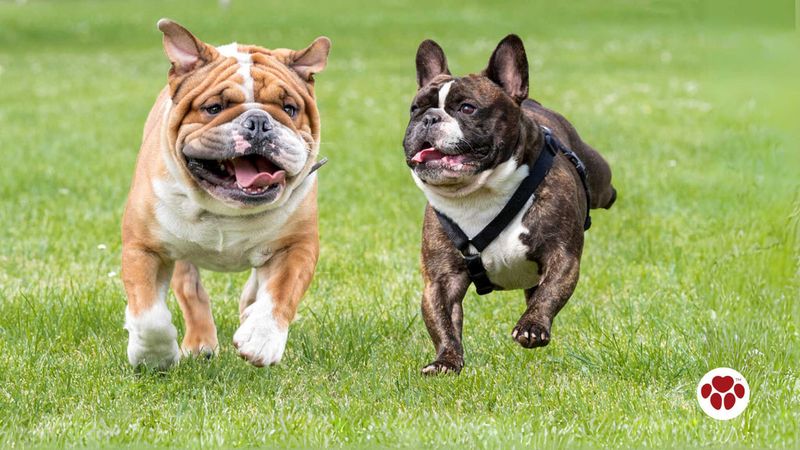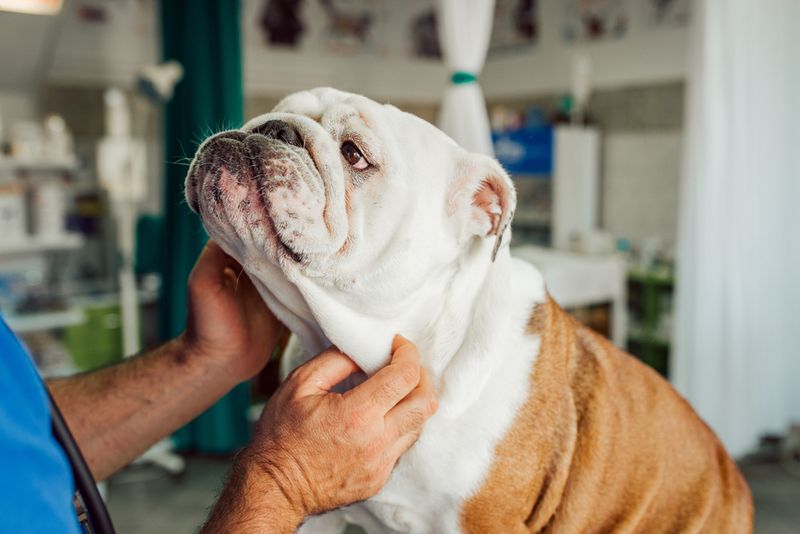English Bulldogs and French Bulldogs—two names that often get tangled in conversation, but these breeds are far from twins.
Sure, they both sport those adorable smooshed faces and sturdy builds, but dig a little deeper, and the differences roar louder than a barking contest.
From their unique body shapes to their quirky personalities, these pups bring their own flavor of charm and character to the dog world.
If you think they’re just size variations, think again!
This guide breaks down ten eye-opening ways English and French Bulldogs stand apart, helping you spot the real deal and pick the perfect companion.
Get ready to meet the bulldog breeds that steal hearts in very different ways!
Physical Appearance

The English Bulldog’s robust frame is unmistakable, with its broad shoulders and muscular build. Contrast this with the French Bulldog’s compact and lean physique.
Both breeds sport a charming wrinkled face, yet the English Bulldog’s wrinkles are more pronounced. Their ears differ too; French Bulldogs have bat-like ears that stand erect, while English Bulldogs have smaller, folded ears.
Each breed has a unique coat texture and coloration, adding to their distinct appearance. Their tails tell a tale of difference, as well—French Bulldogs typically have a straight or corkscrew tail, unlike the English Bulldog.
Temperament

English Bulldogs exude a calm and laid-back demeanor, making them the ideal couch companion. In contrast, French Bulldogs bring an element of playfulness and curiosity to any household.
While both breeds are known for their affectionate nature, the French Bulldog often showcases a mischievous streak. English Bulldogs, renowned for their patience, are often content with a relaxed lifestyle. Meanwhile, French Bulldogs thrive on interaction and play.
These distinct temperaments make choosing between the two a matter of personal preference, depending on one’s lifestyle and activity level.
Exercise Needs

The exercise requirements of these breeds diverge significantly. English Bulldogs are content with short, leisurely walks, preferring to lounge post-activity.
French Bulldogs, on the other hand, relish a brisk play session or a spirited walk. Their energy levels demand more frequent activity to maintain fitness. Both need regular exercise, but the levels vary; French Bulldogs often require more to prevent boredom.
This difference is crucial for potential owners to consider, as it impacts daily routines and overall health. Choosing a breed aligns closely with one’s lifestyle and activity preferences.
Health Concerns

Health considerations are paramount when choosing between these breeds. English Bulldogs are prone to respiratory issues due to their brachycephalic nature.
French Bulldogs share similar concerns but are often less severe. Skin conditions are common in both, requiring regular grooming and care. Joint issues, particularly hip dysplasia, are prevalent in English Bulldogs.
It’s essential to understand these health nuances, as they influence the care and attention each breed requires. Regular vet visits and a proactive approach to health can mitigate some of these issues, ensuring a happy, healthy pet.
Size and Weight

English Bulldogs are larger and heavier, with males averaging 50 pounds. Their stocky appearance contrasts sharply with the French Bulldog’s petite frame, which typically weighs around 20-28 pounds.
Size plays a pivotal role in their adaptability to living conditions. A spacious environment suits the English Bulldog, whereas the French Bulldog thrives in compact spaces.
This size disparity impacts travel and transport convenience as well. Understanding these size and weight differences is crucial for potential owners when considering living arrangements and lifestyle accommodations.
Barking Tendencies

Barking behaviors significantly distinguish these breeds. French Bulldogs are known for their vocal expressions, often barking when excited or alerting to unfamiliar occurrences.
Conversely, English Bulldogs are relatively quiet, barking only when necessary. This trait makes English Bulldogs suitable for those seeking a more serene atmosphere at home. French Bulldogs’ vocal nature adds an element of communication and alertness.
Understanding these barking tendencies can aid in selecting a breed that aligns with one’s noise tolerance and lifestyle preferences. Each breed offers unique auditory experiences.
Social Behavior

Both breeds exhibit distinct social behaviors that cater to different household dynamics. English Bulldogs are typically more reserved and enjoy calm, quiet environments.
Their laid-back social nature makes them great for individuals or families seeking a peaceful companion. In contrast, French Bulldogs are social butterflies, thriving in lively settings with frequent interactions.
Their playful and engaging demeanor makes them ideal for families with children or active individuals. These differences in social behavior make each breed appealing to different types of pet owners.
Trainability

When it comes to trainability, French Bulldogs exhibit a keen aptitude for learning tricks and commands. Their curious and attentive nature aids in training sessions.
English Bulldogs, however, are known for their stubborn streak, which can make training more challenging. Consistency and patience are key when training both breeds. While French Bulldogs quickly grasp new commands, English Bulldogs may require more repetition and encouragement.
Understanding these training dynamics helps potential owners prepare for the unique challenges and rewards of training their chosen breed.
Living Conditions

Living conditions significantly influence the suitability of each breed. English Bulldogs benefit from having ample space due to their larger size, making them well-suited for homes with backyards.
Conversely, French Bulldogs adapt seamlessly to apartment living, thanks to their compact size and moderate exercise needs. These breeds’ living requirements should align with potential owners’ living environments.
Understanding these preferences ensures that each breed thrives in its new home, balancing space with their need for companionship and activity. Choose according to your lifestyle and space availability.
Grooming Requirements

Grooming needs vary between the two breeds. English Bulldogs require regular care for their deep facial wrinkles to prevent irritation and infections.
Their short coat needs occasional brushing to minimize shedding. French Bulldogs, with their smoother skin, need less frequent wrinkle care but benefit from regular brushing to keep their coat shiny and healthy. Nail trimming and dental hygiene are essential for both breeds.
Understanding the grooming requirements helps potential owners plan for the time and effort needed to maintain a healthy, clean pet, impacting the overall pet care routine.

